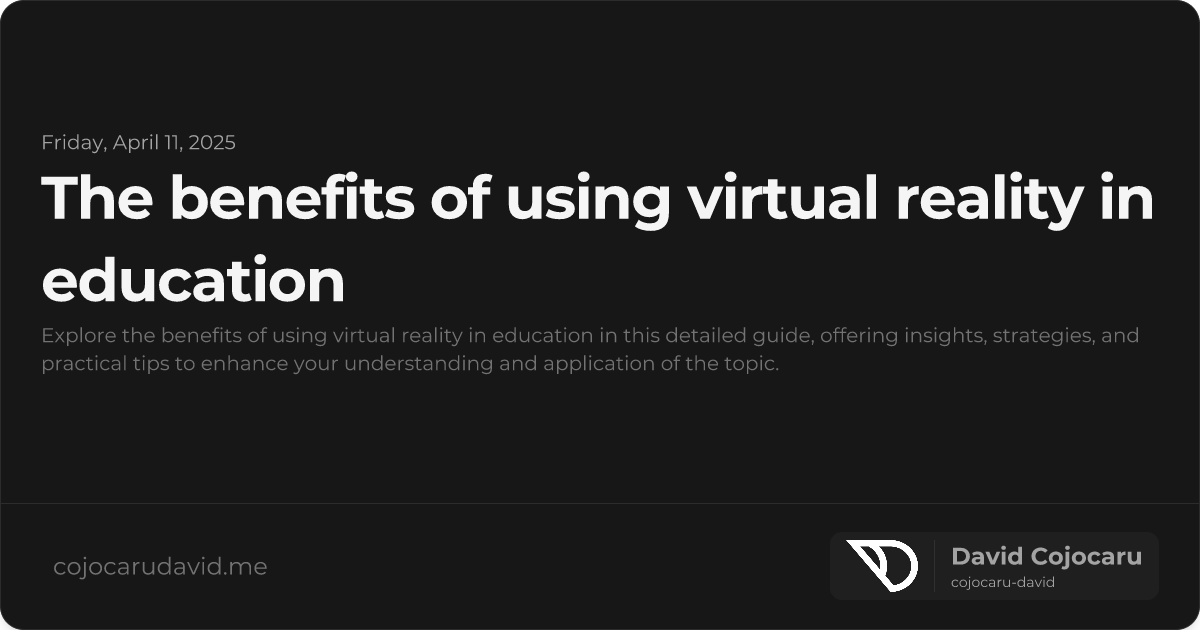Unlock Learning Potential: The Transformative Power of Virtual Reality in Education
Virtual Reality (VR) is no longer a futuristic fantasy; it’s a powerful tool reshaping education. Imagine students exploring ancient Rome, dissecting a human heart, or designing a skyscraper – all within the immersive world of VR. This innovative technology is transforming how students learn, offering a myriad of benefits, from increased engagement to improved knowledge retention. Let’s explore how VR is revolutionizing the classroom.
Ignite Engagement and Fuel Motivation
Traditional teaching methods can sometimes fall short in captivating students. VR offers a compelling solution by providing interactive and engaging simulations that make learning an adventure.
- Immersive Experiences: Step inside the lesson! VR environments command attention far more effectively than textbooks, drawing students into the subject matter.
- Gamified Learning: Learning becomes a game! VR incorporates elements of game design, like rewards and challenges, to encourage active participation and a sense of accomplishment.
- Experiential Learning: Learn by doing! VR provides hands-on experiences, allowing students to explore and interact with concepts in a tangible way, fostering deeper understanding.
Research consistently demonstrates that students learning with VR exhibit higher levels of engagement and retain information for longer periods, thanks to the emotional and sensory connections forged during immersive lessons.
Enhance Knowledge Retention Through Experiential Learning
VR’s strength lies in its ability to facilitate experiential learning, a method proven to dramatically enhance memory retention. Instead of passively receiving information, students actively participate and interact with the material.
- Visual and Spatial Learning: Complex concepts become clear! VR excels at visualizing abstract ideas and spatial relationships, making them easier to grasp and remember.
- Simulated Scenarios: Practice makes perfect! VR allows students to repeatedly practice skills and reinforce lessons in realistic, simulated environments.
- Multi-Sensory Input: Engage the senses! By stimulating sight, sound, and sometimes even touch, VR creates richer learning experiences that strengthen recall and comprehension.
Consider medical students using VR for anatomy studies. By virtually “walking through” the human body, they develop a much deeper understanding of anatomy, leading to significantly improved performance on exams.
Foster Accessibility and Inclusivity in Education
VR has the power to break down barriers for students with disabilities and those living in remote areas, making education more accessible and inclusive.
- Virtual Field Trips: Explore the world without leaving the classroom! VR enables students to visit historical sites, museums, and natural wonders, regardless of their physical limitations.
- Customizable Learning Experiences: Tailored to individual needs! VR can be customized to accommodate different learning styles and needs, such as providing dyslexia-friendly text or adjustable pacing.
- Language Immersion: Immerse yourself in a new language! VR creates realistic settings for practicing language skills, helping non-native speakers gain confidence and fluency.
VR ensures that high-quality educational experiences are available to all, regardless of their physical, geographical, or learning differences.
Create Safe and Controlled Learning Environments
VR provides a secure and risk-free environment for students to practice high-stakes skills and experiment without real-world consequences.
- Medical Training: Practice without risk! Medical students can hone their surgical skills in a virtual operating room without jeopardizing patient safety.
- Engineering Simulations: Test prototypes virtually! Engineers can test the performance and safety of prototypes in simulated environments before investing in physical construction.
- Emergency Drills: Prepare for the unexpected! Students can participate in realistic emergency drills, such as fire or earthquake simulations, in a controlled and safe setting.
This ability to learn from mistakes without real-world repercussions is invaluable for developing competence and confidence.
Deliver Cost-Effective Learning Solutions
While implementing VR requires an initial investment, it offers significant long-term cost savings for educational institutions.
- Reduced Need for Physical Resources: Say goodbye to expensive labs and equipment! VR simulations can replace many physical resources, reducing the need for costly labs and equipment.
- Reusable Simulations: One simulation, endless learning! VR simulations can be used repeatedly across multiple classes and cohorts, maximizing their value.
- Lower Travel Expenses: Explore the world from the classroom! Virtual field trips eliminate the need for costly and time-consuming travel.
By optimizing resource allocation, schools and universities can provide cutting-edge education while managing budgets effectively.
Cultivate Future-Ready Skills
VR prepares students for the evolving demands of the digital workforce by familiarizing them with advanced technology and fostering critical skills.
- Coding in VR: Immersive coding experiences! VR provides engaging and intuitive environments for learning programming concepts and developing coding skills.
- Collaborative Virtual Projects: Teamwork in the Metaverse! VR facilitates collaborative projects in virtual spaces, teaching students essential teamwork and communication skills.
- 3D Problem-Solving: Sharpen critical thinking! VR immerses students in 3D environments, challenging them to solve complex problems and develop spatial reasoning skills.
As VR becomes increasingly integrated into various industries, students trained in this medium will possess a distinct competitive advantage in the job market.
The Future of Education is Immersive
The transformative benefits of VR in education are undeniable. From boosting engagement and enhancing knowledge retention to fostering inclusivity and preparing students for the future, VR is poised to revolutionize the way we learn. As the technology continues to advance and become more accessible, its role in classrooms will only expand, creating more interactive, effective, and engaging learning experiences for all.
“Virtual Reality doesn’t just teach—it inspires, engages, and transforms the way we learn.”

